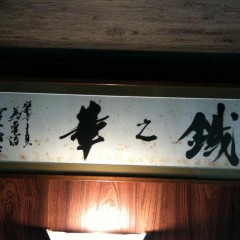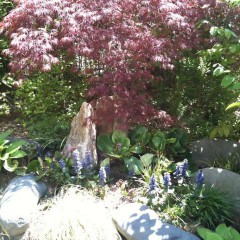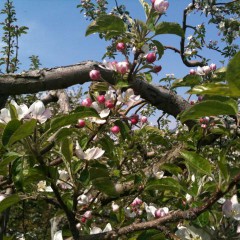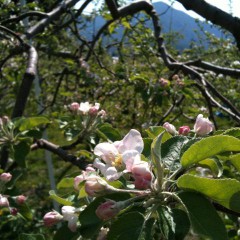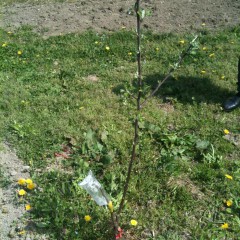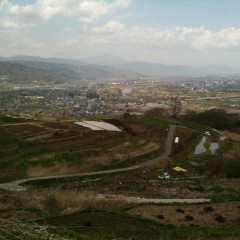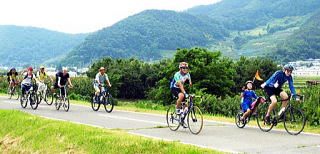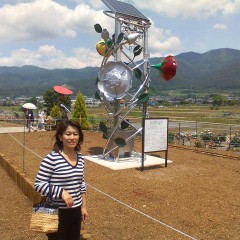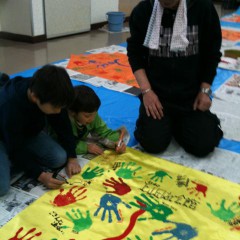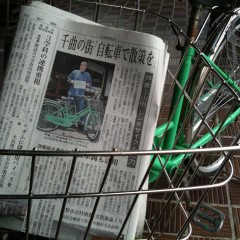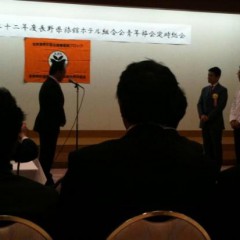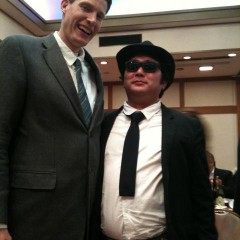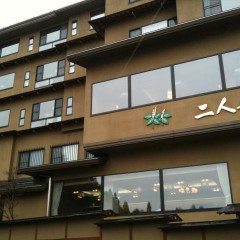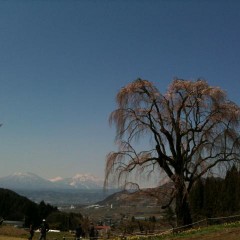昨日は照明器具の話でした。亀清旅館の電球はこれから、蛍光灯を卒業させて、人間や環境により優しいLEDに切り替えたい事。その上に、旅館の落ち着いた雰囲気を深くする為にも照明器具を改善したい。
例えば、亀清の現在の客室照明器具はこの写真のように、10畳の部屋のどう真ん中に天井に丸いタイプの蛍光灯ライトは一つ、そして床の間に真っ直ぐの蛍光灯は1つ。
これで良いのでしょうか?女将社長も部屋によってその天井のライトだけじゃ食事をする時に暗いと言います。昨日に来てくれたミヤモト照明のプロも言っていました。日本の照明の基準が変わってきています。このごろは部屋を段々明るくなってきているそうです。今までのライトじゃ暗いと。
偶然、私が今、読んでいる本にその話題がちょうど出ました。Simon Mayという作家のAtomic Sushiと言う本。彼が10年前ぐらいにUKから来て、東大で一年間で哲学を教えた時に欧米と日本の文化や物の見方の違いの話。
お部屋の明るさや飾りについて、
*欧米室は明るくてカラフルで、太陽の光が中を完全に照らすようになっていて、そしてそこに住んでいる人達の性格や趣味を表現する飾りが沢山置いてある。つまり、日光に合う。
*和室はすっきり感があって、余計な物が置いていない。障子があるから太陽は直接入らなくて、障子の和紙や畳のわらの手ざわりや感触が感じれる。尚且つ、全てを明るく照らすのではなくて、隅や陰が浮いてくる。つまり、月光に合う。
面白いでしょう。私が思いますが、和室は月の光もそうだし、蝋燭の光にも合うのではないか。
この亀清旅館の照明器具を改善する時に、「和室」の本格的な良さを忘れないで、逆にその良さを生かせながらやりたい。そこで、ミヤモト照明のお兄さんにヒントを頂きました。落ち着き感を深める為に、電球はなるべく電球色に、そしてなるべく低くて;天井より床の近い方は人間が静かになる。日本の行灯はその意味で最適だ。
従って、これからは亀清の客室の照明器具は天井から掛けるライトの代わりに、壁を照らすダウンライト、床の間に真っ直ぐの蛍光灯の変わりに壁に掛けてある絵と下に置いてあるオブジィを照らすスポットライトに実践してみたいと思っています。まあ、ちょっとずつ、ちょっとずつ。
Yesterday's topic was about our lighting fixtures here at Kamesei Ryokan, how we are hoping to upgrade from fluorescent to LED lights. In addition, I am hoping to upgrade our types of lighting in order to enhance the relaxing mood of our inn.
For example, our guest rooms typically have one ceiling mounted fixture with round flourescent tubes, and a straight flourescent tube lighting the tokonoma alcove.
Is this the best way to provide lighting for the guestrooms? Even our boss here (my mother-in-law) complains that the one ceiling fixture doesn't provide enough light -- the guests can't see what they're eating. The lighting pro that came yesterday mentioned that Japan's lighting level standards have changed. New construction nowadays would provide more light in these types of rooms.
Just by coincidence, the book I'm reading now discussed that very subject. The book is "Atomic Sushi" by Simon May. He came from the UK about 10 years ago to teach philosophy at Tokyo U. for a year, and he wrote this book based on the differences in Western and Japanese thinking and world view.
Regarding interior decorating, he commented:
*Western rooms tend to be bright and colorful. Windows are positioned as to allow sunlight to reach every nook and cranny. Walls and shelves are covered with decorations and "objects" that express the taste and interests of the owners, personifying the room.
*Japanese rooms on the other hand are usually more reserved and shadows play as much of a role as light does. Sunlight doesn't come in directly, but is filtered through the rice paper of the shoji screens. The texture of the rice paper screens and the straw tatami mats would be lost in harsher light, but come alive with softer light, like that of moonbeams.
In other words, Western rooms are meant for sunlight, and Japanese rooms for moonlight. Interesting ideas. I would add that traditional Japanese rooms are enhanced by candlelight, too.
As we upgrade the lighting here at Kamesei, I want to use it as much as possible to enhance the inherent calming aspects. The lighting expert gave us some tips: Use warmer colored light bulbs, and the lower the better. I intend to use his ideas to use downlights to light the walls, bringing the focal point of the lighting down closer to the floor. And use spotlights in the tokonoma to focus light on the wall hanging and the object placed at the bottom of the alcove.
It'll be fun to play with some of these ideas.
For more on "Atomic Sushi"の詳しくはこちら
http://www.amazon.com/Atomic-Sushi-Simon-May/dp/1846880483/ref=sr_1_1?ie=UTF8&s=books&qid=1272154935&sr=8-1
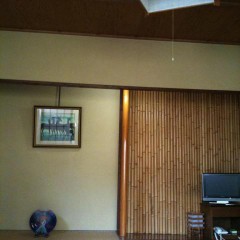
Old style lighting -- How can this be improved?
